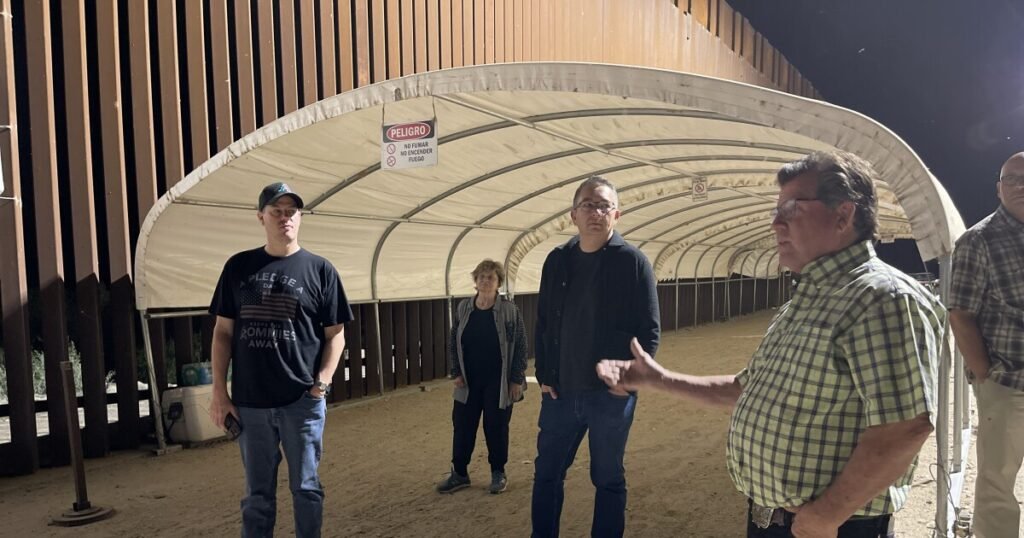YUMA, Ariz. — With national attention once again focused on the southern border ahead of President Joe Biden's policy announcement on Tuesday, Arizona lawmakers traveled to Yuma to see the border for themselves.
A delegation of House Republicans from across the state traveled to border towns to inspect border operations, meet with local leaders, including the Yuma County Supervisor, and visit local crisis shelters.
“What really struck me was how routine it all was,” state Rep. Justin Wilmes (R-15th District) said at a news conference in Yuma after the tour Monday. “The Border Patrol is doing their job. They're doing everything they have to do, everything they can do. And then an illegal immigrant comes in and they stand there very calmly. They know how to do it.”
In Arizona, and soon across the nation, we will likely see competing plans for how to handle the record numbers of migrants traveling through the southern border.
“This is essentially the federal government's job, but the federal government isn't running it,” said House Speaker Ben Toma, Republican of Arizona's 27th Congressional District.
One solution, say Republican lawmakers from the Grand Canyon State, would be to give local law enforcement the power to arrest people suspected of crossing the border illegally. Currently, local agencies like police and sheriff's departments cannot arrest people who cross the border illegally, and if they do, they risk being sued by both the federal government and privately.
Republicans said their plan would give local law enforcement the ability to govern their own communities in a climate where they see a lack of federal leadership.
“Let's do something to at least have the tools in our toolbox to put an end to what's going on,” state Rep. Leo Biasiucci, Republican from the 30th District, pleaded Monday.
The Republican plan, House Joint Resolution 2060, called the “Border Security Act,” is expected to face constitutional challenges if enacted into law, as courts have previously ruled that immigration issues should be the sole responsibility of the federal government.
Lawmakers hope to send HCR 2060 directly to voters on the November ballot. The final vote needed to put it on the ballot is expected to take place Tuesday in the Republican-controlled Arizona House of Representatives, which has already passed the proposal.
If voters approve the Republican immigration enforcement plan, local governments are expected to begin assuming responsibility for arrests, prosecutions, detentions, court dates, referrals to child welfare services and other potential peripheral consequences.
Yuma County Sheriff Leon N. Wilmot told ABC15 there are major problems with the current federal immigration enforcement system.
“There is nothing humane about the current policies of this administration,” Wilmot said of the Biden administration.
However, Wilmot expressed a number of concerns about HCR 2060. When asked by ABC15 if Yuma County can handle the impacts of the passage of HCR 2060, Wilmot said they can't.
“It would be budget-busting, and our county doesn't have the revenue to handle it.”
Wilmot, who has been sheriff since 2013, added that the jail is already struggling financially with unpaid costs associated with detaining immigrants. He estimates that at least $1 million a year in additional funding is needed to meet HCR 2060's new demands on the county jail system.
When ABC15 asked lawmakers how they expected to fund local entities that cover the costs of arrests, detention and prosecutions, they said Republicans don't have sole control over the budget and have to negotiate finances with the other party.
Critics of HCR 2060 worry that the proposal could target some minority communities if passed.
“There is an issue of racial profiling, and there is language in the bill that still gives police officers civil rights immunity,” said Karime Rodriguez, who protested HCR2060 during the Senate floor session in May.
At the national level, President Biden announced an executive order on Tuesday to halt asylum applications at the U.S.-Mexico border when the daily average number of encounters at ports of entry reaches 2,500, and to reopen the border only if that number drops to 1,500, according to the Associated Press. With encounters currently averaging about 4,000 a day, the suspension would effectively close the border immediately.







